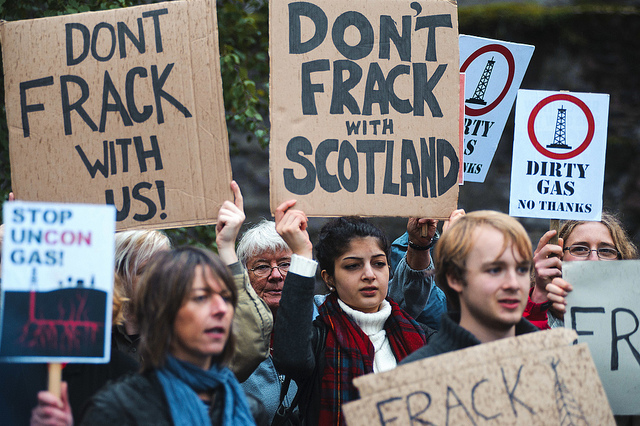Glasgow City Council has been prevented from banning fracking by Scottish Government officials.
The government’s planning unit made the ruling in response to an objection by a company backed by the petrochemical giant INEOS, which wants to frack for shale gas under a large part of the central belt.
The move has sparked concerns amongst environmental and community groups, who fear that ministers could end up permitting the controversial technology, which fractures underground rocks to release gas. They say planning policy should be reformed.
Last week Scottish ministers blocked the development of the related but different technology of underground coal gasification, which involves setting fire to coal under the seabed. They have asked Westminster to rescind existing coal gas licences for the Firth of Forth and the Solway Firth.
But this has prompted renewed anxiety that ministers may be preparing to allow fracking after their moratorium and public consultation are completed next year. INEOS, which runs the Grangemouth petrochemical plant, is lobbying strongly in favour of fracking.
Two small areas of Robroyston and Milton to the north of the city are included in a UK government licence for fracking onshore gas. When Glasgow City Council prepared its development plan for the next ten years, it sought to rule them out.
“Given the size of these areas, and their proximity to communities (either existing or proposed), applications for extraction of onshore oil and gas are unlikely to be acceptable in Glasgow,” it said.
But an Aberdeen-based gas company, ReachCSG, objected, arguing that government planning policy should favour onshore gas development. ReachCSG, which acquired the fracking licence, sold 80 per cent of its development rights to INEOS in 2014.
As a result Scottish Government planning reporters overturned the city council’s policy, amending it so that fracking wasn’t barred. They agreed with ReachCGS “that the matter should not be pre-judged”.
The policy now says that fracking developments will be assessed and buffer zones introduced to ensure communities aren’t facing “unacceptable risks”. Only when the proposed buffer zones are considered inadequate will planning permission be refused.
Friends of the Earth Scotland argued that the government needed to toughen up its planning policy. “It is very concerning that government reporters would prevent a local council from going further than the bare minimum of national planning policy in seeking to protect their citizens from the threat of fracking,” said the environmental group’s head of campaigns, Mary Church.
“While the current moratorium means fracking can’t go ahead in Glasgow, or anywhere else in Scotland, planning policy clearly doesn’t go far enough. This also demonstrates the need to swiftly bring planning policy in line with the Scottish Government’s recent ban on underground coal gasification.”
Glasgow Green councillor, Martha Wardrop, wanted national planning policy to rule out fracking. “It should be possible for Glasgow’s development plan to retain strongly worded planning policy which protects the City from fracking,” she said.
“Local authorities have a crucial role in putting pressure on Scottish Government to adopt planning rules which effectively ban extraction of onshore oil and gas.”
According to Barry Dalgleish from Frackwatch Glasgow, the council had been forced to fall in line. “The Scottish Government should tighten up the national planning framework to make it more robust,” he said.
Glasgow City Council pointed out that the government was reviewing its position. “The council has accepted the proposed modification by Scottish Government reporters to the city development plan which is intended to align the plan with national policy,” said a council spokesman.
The Scottish Government stressed that its moratorium currently prevented fracking anywhere in Scotland. It would be publishing reports on the impact of the industry, and holding a public consultation over the winter.
“The government will use the results of the consultation to inform its decision on the way forward,” said a government spokeswoman. “The reporters’ recommendation simply reflects the current situation.”
ReachCSG did not respond to a request to comment. INEOS pointed out that the planning system was designed to assess applications on their merits.
“Consultation with communities and independent regulatory authorities is vital to identify potential impacts on the community, to scope potential benefits and from this to develop plans to mitigate potential impacts and enhance the benefits,” said the company’s spokesman, Richard Longden.
A version of this article was published in the Sunday Herald on 9 October 2016.
Photo thanks to Friends of the Earth Scotland.














